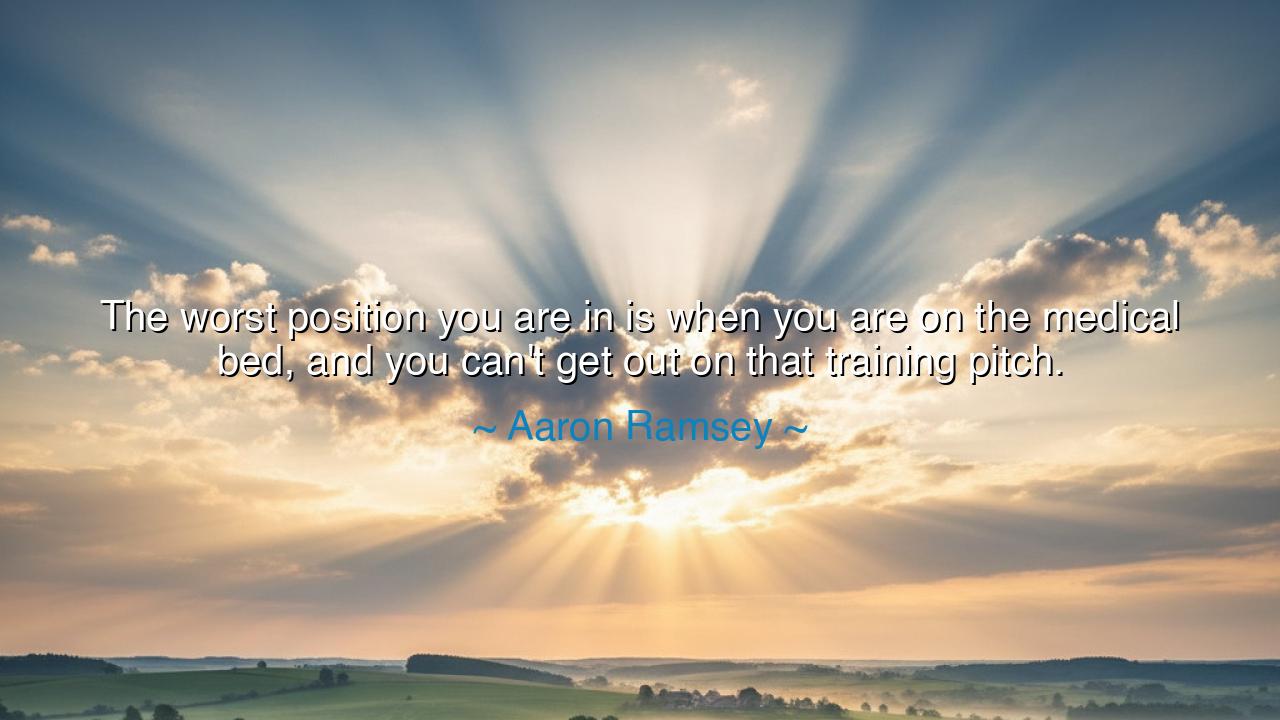
The worst position you are in is when you are on the medical bed
The worst position you are in is when you are on the medical bed, and you can't get out on that training pitch.






In the struggle for greatness, few things are more disheartening than being held back by an injury or illness, when the very thing you have dedicated your life to—your training, your craft, your passion—becomes suddenly out of reach. Aaron Ramsey, in his words, captures this profound frustration: "The worst position you are in is when you are on the medical bed, and you can't get out on that training pitch." This statement speaks to the deep yearning of an athlete, or indeed anyone, whose life's work and purpose are disrupted by circumstances beyond their control. In these words, Ramsey reveals the struggle between the desire to perform and the reality of physical limitation.
In the ancient world, the pursuit of excellence, particularly in sports, was seen as not just a physical challenge, but a spiritual one. The Greeks, with their reverence for Olympic games, believed that competition was a way of honoring the gods. They understood the tension between ambition and disability, recognizing that the mind and body must work together in the pursuit of greatness. Yet, as Socrates taught, even the most disciplined athlete was subject to the vicissitudes of life, and the most carefully honed body could be brought low by illness or injury. The ancient athletes knew that their glory was tied not just to their skill, but to their resilience in the face of setbacks. Ramsey’s quote is a modern echo of this ancient understanding: that the worst situation is when you cannot act, when your body is not your own, and your training—your purpose—is halted.
The story of Alexander the Great offers a striking example of how an athlete’s struggle mirrors that of a leader. Alexander, renowned for his physical prowess and strategic genius, faced a life-altering challenge when he contracted fever in 323 BC. In that moment, the mighty conqueror, who had crossed continents, was rendered helpless, unable to lead his armies or continue his quest for glory. His body, once a vessel of strength, became the very thing that betrayed him, reminding us all that no matter how great the athlete, the warrior, or the king, we are all susceptible to forces beyond our control. Ramsey’s words capture the vulnerability that accompanies greatness—the fear of losing your ability to act, to move, to perform.
In the Roman Empire, gladiators were often revered as both warriors and athletes, and their bodies were the instruments of their fame and fortune. Yet, even the mightiest of gladiators faced the harsh reality that injury could end their careers in an instant. The greatest fear of a gladiator was to be taken off the arena floor, rendered incapable of fighting by a wound, thus losing their purpose and their identity. Just as Ramsey reflects on the despair of being sidelined from the pitch, the gladiator feared that their worth was entirely tied to their ability to fight, to perform, to prove themselves on the field of battle. In both worlds, athletes and warriors understand that their identity and their meaning are often bound to their physical ability, and when that ability is taken away, the soul feels lost.
Ramsey’s insight speaks not only to athletes but to all people who devote themselves to their craft. Vinci, the great Renaissance polymath, is often admired for his intellectual genius and artistic mastery. Yet, his story is also one of constant struggle, as his body often failed him, particularly in the latter years of his life, when physical ailments stifled his creative output. Leonardo da Vinci knew well the frustration of wanting to create but being physically unable to do so, and like Ramsey, he must have known that the worst situation for a creator is when their hands, the instruments of their purpose, are no longer able to fulfill their calling.
The lesson from Ramsey’s words is one of resilience. While the fear of being sidelined by injury or illness is universal, it is not the absence of setbacks that defines greatness, but the response to them. The truly great—whether athletes, artists, or leaders—learn to adapt to adversity and use their challenges as stepping stones to greater strength and wisdom. Just as Leonardo da Vinci found new ways to continue his work despite physical pain, and Alexander the Great faced his vulnerability with courage, so too must we all face the moments when we are on the medical bed with fortitude and patience.
In our own lives, whether we are faced with physical injury, mental exhaustion, or emotional setback, we must remember that true greatness is not about avoiding challenges but about rising above them. Let Ramsey’s reflection remind us that our identity is not solely tied to our physical abilities or outward success, but to our capacity for resilience, determination, and adaptability in the face of adversity. The pitch may be where we perform, but it is in how we handle the moments when we are forced to rest, to recover, and to reflect that we find the true strength of our character. In this, we honor the spirit of resilience, which is the foundation of true greatness.






AAdministratorAdministrator
Welcome, honored guests. Please leave a comment, we will respond soon